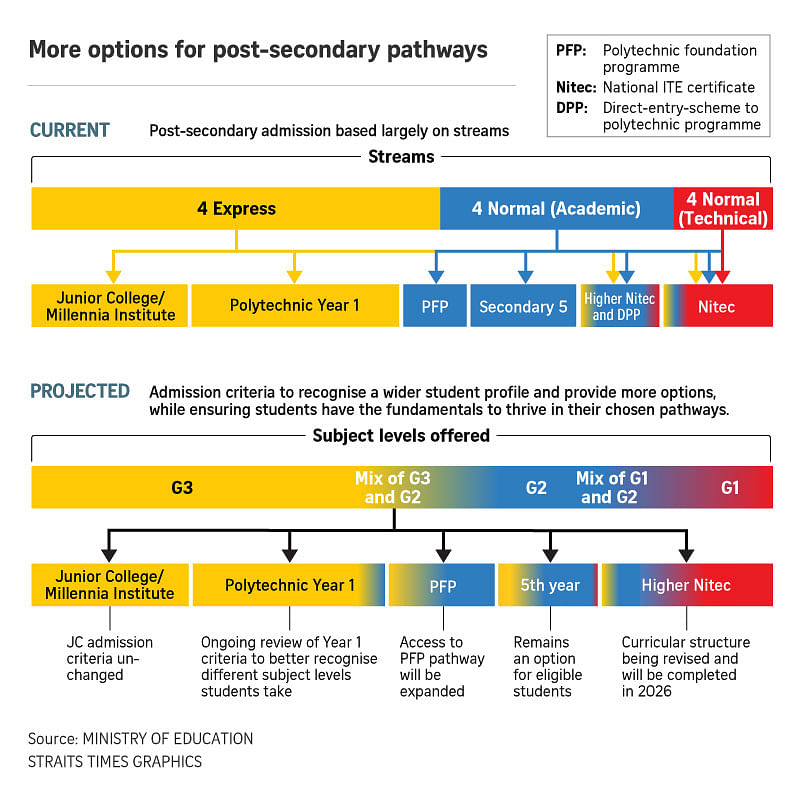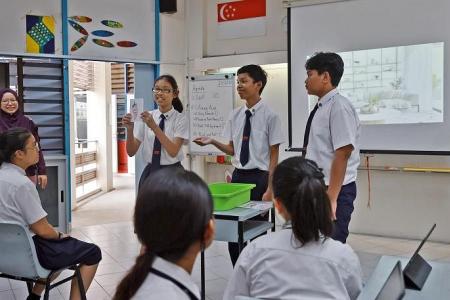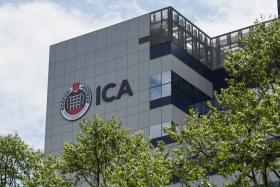More help for disadvantaged and special needs students: Maliki Osman
A programme to help disadvantaged students stay in school will be expanded nationwide in 2023, Second Minister for Education Maliki Osman said on Wednesday in Parliament during the debate on the Ministry of Education’s (MOE’s) budget.
The Uplifting Pupils in Life and Inspiring Families Taskforce (Uplift) Community Network, which has been operating in 12 social service office towns since 2022, will be rolled out to 12 remaining towns.
The scheme, which is part of the Government’s efforts to tackle inequality, expects to support about 1,300 students from around 110 schools in 2023, up from some 900 students in 89 schools in 2022.
The 12 towns coming onboard are Ang Mo Kio, Bukit Batok, Bukit Panjang, Clementi, Hougang, Jurong East, Pasir Ris, Queenstown, Sembawang, Serangoon, Taman Jurong and Tampines.
Under the programme, students from disadvantaged backgrounds who exhibit early signs of absenteeism are identified by schools and referred to a coordinator in the town’s social service office.
The coordinator links students and their families to community resources and programmes that will help the student get back to regular school attendance, as well as support the parents in the form of befriending, relating to their children or meeting childcare needs.
Responding to observations by Mr Shawn Huang (Jurong GRC) and Ms He Ting Ru (Sengkang GRC) that such students may find it harder to keep up in school, Dr Maliki said MOE will continue to work closely with other government agencies to ensure that students and their families receive more coordinated and seamless support. This includes further integrating processes with other social service initiatives like ComLink and KidStart.
More support for students with special needs
In line with recognising diverse strengths among students, the MOE will encourage more interactions among students from different profiles, including those with special needs, said Dr Maliki.
This will be done through tie-ups between general education (Gen Ed) schools and special education (Sped) schools, which will from 2023 expand and deepen existing partnerships.
Dr Maliki said this will replace satellite partnerships, a 2007 scheme where Sped schools partnered Gen Ed schools to conduct joint learning activities. There are currently 19 Sped schools partnering 22 mainstream schools.
The new school partnerships, he added, will also focus on mutual professional learning among teachers. The MOE said it hopes to have more multi-way partnerships under the new scheme.
Responding to Mr Huang, Ms Rahayu Mahzam (Jurong GRC) and Ms Denise Phua (Jalan Besar GRC), who called for MOE to do more to support Sped students, Dr Maliki said the ministry will launch two more Sped syllabuses in communication and language and socio-emotional learning, as part of raising the quality of teaching and learning in Sped schools.
These will be rolled out in August 2023.

The curriculum will place a stronger emphasis on communication and skills to connect meaningfully with others in society, as well as developing self-determination and resilience to cope with challenges and changes, added Dr Maliki.
“These are important life skills to better support students with special educational needs in their transition to post-school as they integrate with the larger community, helping them live independently, learn continuously and work productively.”
The ministry has since 2020 come up with teaching and learning syllabus across seven areas, he said. Three syllabuses were introduced in the past two years in the learning domains of visual arts, daily living skills and vocational education.
Expanding post-secondary opportunities
With full subject-based banding in place by 2024, admissions criteria for post-secondary pathways will be adjusted to recognise more diverse profiles of learners, added Dr Maliki.
More students will have access to the Polytechnic Foundation Programme (PFP), which allows students to apply directly to a polytechnic for a foundation year instead of completing Secondary 5 and the O levels.
Today, the PFP is open only to eligible students from the Normal (Academic) stream.
Starting with the 2028 intake, or the 2024 Secondary 1 cohort, students taking G3 subjects or a mix of G3 and G2 subjects can apply for the PFP.
As a result, up to 2,600 students will be eligible, compared to about 1,700 today.
From the 2026 intake, students will also be admitted under the PFP in three broad clusters – sciences, design, engineering and technology, and humanities, art, media and business – before being posted to a specific course.
Dr Maliki said: “Students will have more time to make informed choices. Polytechnics can also better match students’ interest and abilities with specific diplomas. This builds on our efforts to expose students to multiple courses in a cluster before deciding on a specific diploma.”
The MOE will also review polytechnic admissions to better recognise the different subject levels taken by students, he added.
“For example, today students have to take five G3 subjects to be eligible for Polytechnic Year 1. With full subject-based banding, some may take subjects at the G2 level, and we are exploring allowing one G2 subject to be considered for admission.”
Institute of Technical Education (ITE) students will also have more options to deepen their skills, said Dr Maliki.
In 2023, ITE will launch four new work-study diplomas and three technical diplomas. A total of 1,400 places will be offered across its diploma programmes, enabling more than 10 per cent of ITE Nitec and Higher Nitec graduates to progress through these pathways.
Get The New Paper on your phone with the free TNP app. Download from the Apple App Store or Google Play Store now


